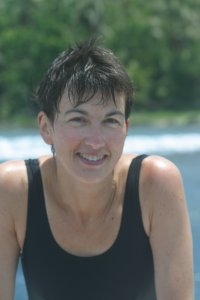-
Dr Isabelle M. Côté
Centre for Ecology, Evolution and Conservation
School of Biological Sciences, University of East Anglia
Norwich
I grew up in French in Montreal, Canada. I did all my schooling in French, but went to english-speaking McGill University for my first degree in marine biology. From aged 12 until the end of my BSc, I was a competitive swimmer, training up to five hours a day. The last competition I did was a 15-km marathon in a lake in northern Quebec!
During my first degree, I learned to scuba dive. This allowed me to do a study of sea urchins in Barbados, where McGill has a field station, for my honours research roject. While in Barbados, I also took a course in behavioural ecology - the study of the evolution of behaviour in relation to environmental factors. Both this course, and working on coral reefs, gave me a direction that I have followed ever since. I went on to do a masters degree on the mating behaviour of a small coral reef fish, technically at the University of Alberta but I spent most of my time in Barbados. For my PhD, at the University of Toronto, I studied the role of parasites in the evolution of social behaviour in fish, with my fieldwork being carried out in a lake in Ontario. In 1992, I followed my partner (now husband), also an ecologist, to Oxford and finished writing my PhD while I was working as an assistant book editor at Oxford University Press for two years.
After a short-postdoctoral study of coral reef fish in Barbados (again!), I moved to UEA where I'm now a senior lecturer supervising eight PhD students. I am still working on the behavioural ecology of reef fish, although my main interest now centres on the evolution of cleaning behaviour. This work has brought me to many Caribbean islands and, more recently to Indonesia and to the Pacific island of Guam. I now also do a lot of conservation research, documenting the changes that have occurred on Caribbean reefs over the past 20 years.
Fieldwork has become more challenging since the birth of my two daughters (now 7 and 2), but we take them along as often as possible and they've become proficient snorkellers. When I'm not at UEA or in the field, I still swim (with a Masters' club), play squash, do aerobics, and watch birds and nature in general. East Anglia is perfect for that!
